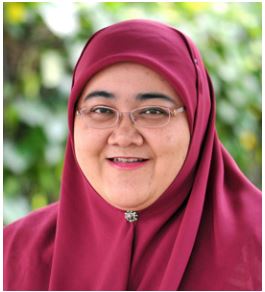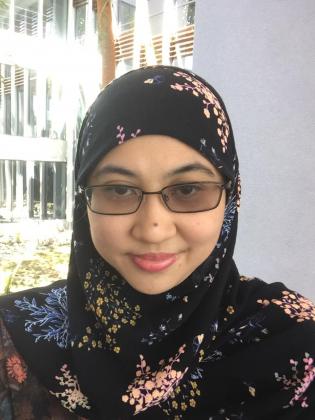
Dr. Hjh Norhayati Hj Ahmad
Institute for Biodiversity and Environmental Research, UBD
norhayati.ahmad@ubd.edu.bn
“Analysis of hyperuricemia, inflammatory and antidiabetic activities in selected medicinal plants”
Hyperuricemia is a condition depicted by elevated uric acid levels in the blood and is commonly manifested in the form of gout (a painful form of inflammatory arthritis). Current treatment includes the use of a synthetic drug, allopurinol, to lower serum uric levels. However, its use has been associated with side effects ranging from nausea and emesis (vomiting) to the life-threatening severe cutaneous adverse reaction (SCAR) of which the Asian subpopulations of Han Chinese, Thai and Korean descents were found to be at higher risk of due to the HLA-B*15:02 allele they carry. As a natural alternative to the drug, Prunus cerasus (tart cherries) have been revealed to be effective for lowering uric acid levels due to its high anthocyanin content. Unfortunately, the cost and unavailability of this seasonal fruit has deterred many gout patients from pursuing this alternate remedy. In light of the lack of affordable treatment options especially to the aforementioned Asian subpopulations, the aim of this research project is to identify other natural anti-hyperuricemic sources by determining the anti-hyperuricemic potentials of various plant species whilst comparing their anti-inflammatory capacities.
As anthocyanins/phenols have been documented to be effective against hyperuricemia and inflammation, we identified 10 plants with significant anthocyanin levels or anti-inflammatory/antioxidant properties that have not been investigated for their anti-hyperuricemic properties. Furthermore, we also wish to compare the effects of different preparation methods on the hypouricemic and antiinflammatory activities of some plants that have been previously shown to have anti-hyperuricemic potentials. Additionally, since hyperurecemia is also linked to diabetes, we wish to also investigate the antidiabetic properties of the plant extract.
This study will enable us to identify candidate plants for downstream mechanistic investigations on anti-hyperuricemia, anti-inflammation and antidiabetes which will provide us a lead into future exploration of commercialization products.
Reference:
UBD/RSCH/URC/2024/001
1 July 2024 – 30 June 2026
Total Grant = $32,000.00
No. of students working under present grant:
1 undergraduate student

Dr. Hjh Norhayati Hj Ahmad
Faculty of Science, UBD
norhayati.ahmad@ubd.edu.bn
“In vivo Study on the Biological Activities of Litsea elliptica Blume”
Litsea elliptica Blume, locally known as “Pawas”, is a medicinal plant found in Brunei Darussalam that has been customarily consumed and used as a vegetable and herbal medicine to relieve headaches, fevers, itchiness and stomach ulcers. Earlier studies have shown that the plant possesses various bioactive chemical compounds in its leaves and bark. The extracts and essential oil from the plant have also demonstrated antioxidant, antimicrobial and insecticidal activities. Our previous investigations revealed that L. elliptica had enhanced antioxidant capacity in its young leaves whereas the mixed (young and matured) leaves of the plant had potent anti-cancer properties against various cancer cell lines. At present, our efforts are focused on addressing the knowledge gap that remains for the traditional use of L. elliptica as we work towards elucidating the therapeutic effects of the plant against inflammation, fever and pain as well as its potential as a natural remedy for migraine. The outcome from our study would be beneficial as a form of verification for the folkloric usage of L. elliptica and also form a basis for future product development which would, thereafter, contribute towards economic diversification.
Reference:
UBD/RSCH/URC/NIG/1.0/2022/008
15 March 2022 – 14 March 2025
Total Grant = $40,642.20
No. of students working under present grant:
1 PhD students
4 undergraduate student

Dr Siti Rohaiza Ahmad
PAPRSB Institute of Health Science, UBD
rohaiza.ahmad@ubd.edu.bn
“Myth versus scientific evidence: effectiveness of selected local Bruneian herbs acting as supplement to control diabetes”
Reference:
UBD/RSCH/URC/NIG/1.0/2019/007
1 January 2020 – 31 December 2023
Total Grant = $32,500.00
No. of students working under present grant:
1 PhD students

Dr Anne Cunningham
PAPRSB Institute of Health Science, UBD
anne.cunningham@ubd.edu.bn
“In vitro Evaluation of Aryl Hydrocarbon ligands in local plants – potential immunomodulatory effects”
Reference:
UBD/RSCH/URC/NIG/1.0/2019/005
29 July 2019 – 31 July 2022
Total Grant = $22,000.00
No. of students working under present grant:
1 MSc students
1 undergraduate student

Dyg Noralipah Mohamed
Academy Brunei Studies, UBD
noralipah.mohamed@ubd.edu.bn
“Documentation and Conservation of Traditional Herbal Knowledge”
Reference:
UBD/RSCH/URCNIG/1.0/2019/004.
Approved on 18 March 2019
No. of research assistants working under present grant:
3 PhD students

Dr Pooja Shivanand Breh
Faculty of Science, UBD
pooja.shivanand@ubd.edu.bn
“Microbial Induction of Agarwood”
Reference:
UBD/RSCH/URCNIG/1.0/2019/003.
Feb 2019 – Feb 2022
Total Grant = B$42,860.00
No. of students working under present grant:
1 MSc student
3 undergraduate students

Dr Mark Petalcorin
PAPRSB Institute of Health Science, UBD
mark.petalcorin@ubd.edu.bn
“Characterizing the Antihypertensive and Antidyslipidemic Effects of Traditional Herbal Medicine on Animal Model Systems for Drug Herbal Research Discovery”
Reference:
UBD/RSCH/URCNIG/1.0/2018/002.
26 Sept 2018 – 2021
Total Grant = $38,500.00
No. of students working under present grant:
2 PhD students